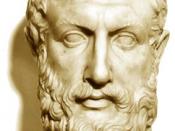Parmenides and Plato were both concerned with ontology (from the Greek 'onta' or being) and questioned the nature of the "real". They both concluded that the world around is a dream or an illusion and that the senses, as opposed to reason, cannot aid us in our quest for truth.
Parmenides was the first of the ancient philosophers to make use of deductive argument and he did this in order to underline the dichotomy between what was commonly believed to be true (i.e. change, motion and growth etc) and what the reason illuminates as real. In Parmenides' own words:
'But the decision about these matters lies in this: it is or it is not.'
What 'is not' cannot be for "is not" is simply a privation of "is"; it is not a piece of Being with matter and form. That which "is" is necessarily corporeal, as J Burnet explains: 'There is no real doubt that this is what we call a body.
It is certainly regarded as being spatially extended for it is quite seriously spoken of as a sphere'.
For Parmenides this perfect sphere of 'being' is eternal, unchanging and immovable. There is no more of it in one part than another, it is perfectly equal and hence there can be no room for movement or growth. Melissus and Zeno developed such arguments, Zeno famously postulating the paradox of motion; if a tortoise were given a head start in a race with Achilles, Achilles would not logically be able to overtake the tortoise, despite being faster, because by the time he reaches the point where the tortoise was the tortoise will have moved ahead of that point. As long as the tortoise keeps moving it will always stay ahead, no matter how small the lead.
By the same...


